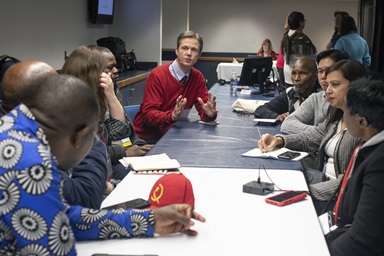Tereza Lee, a straight-A student in Chicago’s public schools, was so dedicated to her education that she won a savings bond for having perfect attendance from kindergarten through eighth grade.
It was only when Lee tried to cash the bond that she discovered what else separated her from the other students: she was undocumented.
Call her the original “dreamer” — inspiration for the U.S. Senate legislation, also known as the DREAM Act, which would stop the deportation of young people who arrived in the U.S. illegally.
Being undocumented was a terrifying reality that potentially could split Lee’s Korean family who had emigrated from Latin America when she was 2 years old. “If we were separated, I would be sent to Brazil, which is completely foreign to me; my parents sent to Korea and my brother, who was born here, to foster care somewhere in Chicago,” she remembered.
The threat of family separation and deportation was highlighted during an interfaith prayer vigil for immigration reform, held April 25 at the United Methodist Church of St. Paul and St. Andrew in New York. Currently, there are an estimated 11 million undocumented immigrants in the U.S., and 2.5 million have been deported during the past seven years.
Sponsored by the New York Conference and the New Sanctuary Coalition, the prayer vigil included testimonies, prayers, hymns and a call to action led by Emma Escobar, a grassroots organizer for immigration with the United Methodist Board of Church and Society.
A week earlier, the U.S. Supreme Court heard oral arguments regarding the legality of two immigration policies of the Obama Administration that would defer deportation for about 5 million immigrants. The policies are the Deferred Action for Parents of Americans and Lawful Permanent Residents program (DAPA) and an expansion of the Deferred Action for Childhood Arrivals program (DACA).
Gifts of Immigrants
“One of the greatest gifts migrants bring is that of diversity… that’s what has made this country strong through the years,” said New York Interim Bishop Jane Allen Middleton. To exclude those gifts of immigrants “is to diminish what this nation can be.”
Those who have citizenship may find it hard to imagine the fears, uncertainty and anguish that the undocumented face every day, she noted, in a political landscape that has fostered “a strange kind of xenophobia” targeting anyone considered to be an “other.”
Middleton’s immigrant great-grandparents “didn’t live in fear of their family being torn apart by deportation,” she said. “They found a welcoming community. This is what I wish for fellow migrants who are now among us.”
The prayer vigil leaders particularly encouraged immediate action against two bills related to onerous new requirements on refugee resettlement — H.R. 4631, a bill that has passed committee in the U.S. House of Representatives, and New York Senate Bill 6253.
Learning to cope
Lee coped with her family’s lack of status by doing what she does best — playing the piano. A rich parishioner gave her a piano as a thank you to her father, a Presbyterian pastor, for his ministry. “I practiced and practiced and practiced as if my life depended on it,” she said.
At the age of 17, she finally revealed her family’s status to a music teacher pushing her to apply for college. Lee and the teacher eventually contacted their U.S. senator about her situation. “Senator Dick Durbin was sympathetic and he wanted to help, but there was no legal remedy as of yet,” Lee recalled. “So he began to write a personal bill… which eventually became known as the DREAM act.”
Lee and a few others were scheduled to fly to Washington on Sept. 11, 2001, to testify at a Senate hearing the next day. Both the flights and the hearing were cancelled after the terrorist attacks. “Fifteen years later, today, we are still fighting for immigrant reform,” she said.
Now 33, Lee is married, a U.S. citizen and working on a doctorate at the Manhattan School of Music. But she remains active in the fight for other undocumented families. “I do believe in prayer,” she said. “I also believe in awareness and becoming educated about what is really going on.”
Twenty-year-old Angelica Idrovo — who came to the U.S. from Ecuador when she was 12, along with her parents and two brothers — also has done her best to cope.
Despite being a straight-A student, her legal status closed most scholarship opportunities to her, so she has worked two jobs while attending community college. She will graduate with an associate’s degree this spring.
“The difference between me and you is just paper,” Idrovo told those at the prayer vigil.
Bloom is a United Methodist News Service multimedia reporter based in New York. Follow her at https://twitter.com/umcscribe or contact her at (615)742-5470 or [email protected]
Like what you're reading? Support the ministry of UM News! Your support ensures the latest denominational news, dynamic stories and informative articles will continue to connect our global community. Make a tax-deductible donation at ResourceUMC.org/GiveUMCom.






